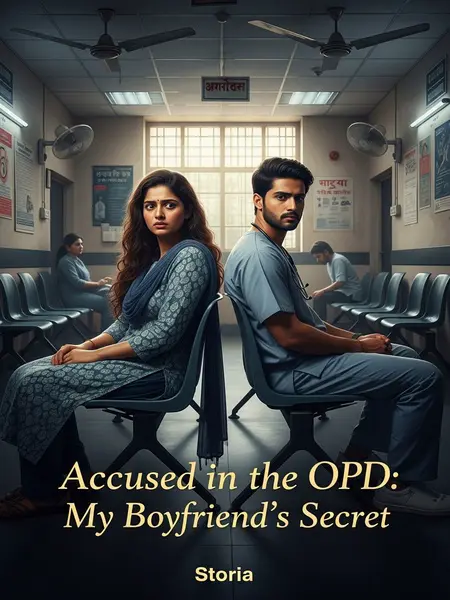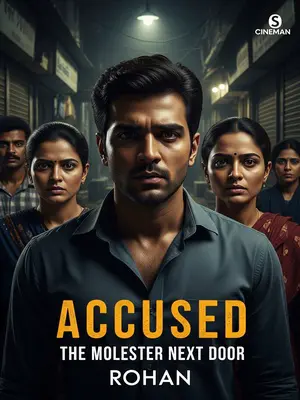Chapter 1: The Rash and the Reckoning
Dr. Rohan, I never imagined a routine hospital visit would end with my boyfriend accusing me—of something I barely understood myself.
The day had started just like any other, the ceiling fan’s soft whirr barely denting Mumbai’s May humidity, while the distant honking of rickshaws seeped through the old window grills. What should have been a simple skin allergy check suddenly twisted into something far more serious—maybe even the end of a relationship.
In India, being a doctor isn’t just about writing prescriptions—it’s a daily game of deduction. You treat illnesses, yes, but you’re also expected to sift through secrets and tangled stories that walk into your OPD along with the patients. And the duty doesn’t end there: you have to hold those secrets close, like a family pandit guarding the kul ki izzat, never letting a careless word slip.
A young man, all swagger in his crisp Zara T-shirt, faded blue jeans, and impossibly white sneakers, strode in with a girl whose gold jhumkas trembled with every step. She wore a pastel kurti, her eyes darting around the room. He clutched the OPD slip in one hand, the other buried in his pocket, his thumb tapping nervously at his phone screen. For a moment, he hesitated at the edge of the examination table, stealing a glance at the girl, fidgeting with his phone as if stalling for time. Only when she nudged him gently did he step forward, finally meeting my gaze.
"What brings you here today? Where exactly are you feeling uncomfortable?" I asked, looking up from my register. Their body language screamed that something was off—this wasn’t just about a rash.
The boy replied, impatience creeping into his tone, "It’s my skin allergy again—an old problem. Just prescribe some medicine. My girlfriend insisted I come to the hospital."
He hesitated, eyes flicking towards the girl, then back to his phone. Only after another awkward pause did he abruptly turn, slowly lifting his T-shirt to reveal his back. I noticed the cracked leather strap of his watch—a small, old-school detail clashing with his otherwise flashy style, maybe a gift from his father. The harsh fluorescent lights above flickered for a moment, spotlighting the scene.
His back was dotted with rashes—light red, patchy, irregular, spreading across his back, chest, and neck. The air in the room thickened, the sharp scent of Dettol mingling with the trace of his aftershave. In the hallway, an old lady’s argument with the receptionist swelled. Her voice rose above the hum of the ceiling fan, mixing with the sharp smell of Dettol and the faint aroma of samosas drifting in from the hospital canteen.
I frowned. This rash didn’t look like typical eczema. Allergic dermatitis, herpes—so many conditions could mimic this. My mind started working, slow and methodical, like a paanwala folding his betel leaves, searching for the telltale red stain beneath.
"What medicine have you used?" I asked, my voice steady and neutral.
"Dermasol. I get this often, and it works wonders," the boy answered, his tone turning proud as if he'd discovered some secret cure. His eyes flicked to the girl, hoping she’d back him up.
She added softly, "He’s been using Dermasol for a week this time, but it hasn’t helped much." She twisted a thin gold ring on her finger, her voice almost apologetic.
"Dermasol? For a week, and still no change?" I couldn’t hide my surprise.
Dermasol is a strong steroid ointment—usually, it zaps eczema in a couple of days, especially with Mumbai’s sticky heat.
But after a whole week, things looked worse, not better. My mind churned over the possibilities, the way a paanwala turns his betel leaf—carefully, searching for clues.
I glanced over at the intern scribbling quietly in the register, his pen scratching out an official record of this ordinary, extraordinary OPD day.
The girl noticed my doubt and asked anxiously, "Doctor, does it not look like eczema?" Her voice trembled, the way it does when you want reassurance but expect bad news.
The boy grew impatient, his voice rising. "I’ve had this for two-three years. Wouldn’t I know if it’s eczema? Doctor, don’t overthink—just prescribe Dermasol." He sounded confident, but I could see the flicker of uncertainty behind his bravado—the kind that follows young men everywhere in this city.
The intern jumped in, a bit too blunt: "That’s a steroid ointment—use it sparingly. The more you use steroids, the worse your skin gets. Eczema can’t be cured, and you can’t keep relying on this medicine." It was the kind of textbook wisdom you expect from a first-year MBBS, not yet tempered by the realities of OPD.
I thought, he’s right, but sometimes the truth needs honey, not just medicine. In the clinic, you learn to wrap your words, just like you’d wrap bitter kadha in a spoonful of sugar.
Eczema really can’t be cured, only managed. Dermasol is powerful, but overuse leaves skin thinner than old receipt paper.
A tip for anyone reading: Don’t use steroids for eczema unless you really have to. During flare-ups, hydrocortisone butyrate is milder than Dermasol and less risky. Most mothers in the waiting room could recite this after years of chasing rashes on their children’s arms.
But in this case, I doubted eczema was the problem. The pattern, the stubbornness, the restless eyes—there was something more.
After a quick examination, I said, "This doesn’t look like eczema."
The boy spun around, tugged down his shirt, and protested, "Impossible. I’ve always treated it as eczema and it worked."
But that’s the issue. If it always worked, why not now? The room grew quiet, broken only by the distant clang of a nurse’s steel tiffin box.
In Indian families, nothing happens without a reason—even if the cause is last week’s biryani or someone’s evil eye.
I stayed silent, letting the doubts settle in. Sometimes, you have to let the facts speak for themselves.
I pressed on, "Any history of allergies? Worn any new fabrics or underwear lately?"
Mumbai’s humidity and the latest trend in synthetic innerwear can wreak havoc on sensitive skin.
"No," he replied. "I did an allergy panel before—dust mites, eggs, seafood, pollen, more than ten allergens. The doctor said I wasn’t allergic to anything." He almost sounded triumphant.
Maybe it’s herpes, I thought. The pattern fit. I was about to order a herpes test when the girl leaned in, her face flustered, whispering softly:
"...take a look, take a look."
Her voice was barely audible. She glanced at me, embarrassment flickering in her eyes, and nudged him gently, her dupatta slipping from her shoulder. She shot a nervous glance at the intern, pulling her dupatta tighter across her chest—a small shield against the sudden scrutiny.
I looked up and saw the boy’s face flush red, his ears burning. A bead of sweat rolled down his temple, untouched by the fan’s lazy whirring.
The girl kept murmuring in his ear, her eyes anxious, gently tugging at his shirt hem as if urging him on. The tension in the room was thick, like the air before a board exam result.
I was still busy filling out the order, when suddenly the girl blurted:
"Doctor, he has it down there too."
The room froze. Even the chaiwala’s bell from the street outside seemed to stop for a second.
"What?" I was stunned. Could it be…
I quickly composed myself and said,
"Take off your trousers, let me have a look."
I called the intern over: "Note these small papules in the perineum, with collar-like scaling at the tip. Remember what they look like."
The intern reached out to lift the shirt further. I caught his arm: "Arrey! Wear gloves! Your hands aren’t clean—don’t touch patients directly. Go wash your hands first."
I suspected a sexually transmitted disease. The curious stares from the corridor outside reminded me how gossip travels, but in our clinics, discretion is our shield.
There was no need for a herpes test—these scaly papules were textbook. I decided to order an STD panel straightaway.
Herpes zoster and pityriasis rosea can look similar; it’s easy to misdiagnose. And in India, people delay coming to the doctor for such things, out of sharam and fear of neighbourhood whispers.
Here’s something most people don’t realise: Dermatology OPDs in India detect many STDs. Sometimes, we’re the first to know these hidden stories.
Many STDs show up as skin problems—HIV, syphilis, HPV. Textbooks call them ‘classic presentations’, but in real life, nothing is ever that clear-cut.
So, was this a syphilitic rash or HIV?
I had my suspicions, but couldn’t say them out loud—not here, not in front of both partners. In our society, one careless word can spread faster than a WhatsApp rumour.
I reminded the intern, "Don’t jump to conclusions before the results come back. Keep the patient calm to avoid unnecessary conflict."
Syphilitic rashes and HIV rashes are both tricky—neither is specific. And we all know how dangerous half-truths are, especially with WhatsApp forwards running wild.
So, I ordered both syphilis and HIV tests.
The boy saw the test order and jumped up, eyes wide. "Syphilis? HIV? I came for eczema! Can’t you just prescribe an ointment? Why all these tests?" He looked like I’d accused him of something unspeakable in the middle of Crawford Market.
The girl, in contrast, put a gentle hand on his arm and said quietly, "Listen to the doctor." There was a quiet strength in her face, the kind that comes out only in moments like these.
I explained, "This isn’t simple eczema—especially with the scaly rash in your perineal area. It could be a sexually transmitted disease." My words hung heavy, like monsoon clouds threatening a downpour.
The boy stared at me, stunned, then fell silent. The silence was thick, broken only by the distant whistle of a chaiwala’s kettle outside.
Sensing his embarrassment, the girl’s voice dropped, her eyes darting to the floor. For a moment, she flashed back to the awkward sex-ed lessons in school—barely a whisper about protection, and certainly no real talk about STDs. Vulnerability crept into her voice as she tried to steady him.
"Impossible, doctor, my boyfriend would never…" She hesitated, looking at him, searching his face for answers even she didn’t want to hear.
I gently cut in:
"We need to run these tests. If your boyfriend has a problem, you should get checked too." I kept my voice as soft as I could, aware that the phrase ‘log kya kahenge’ hovered over every word.
A hush followed, the clock ticking loudly as they exchanged glances—shock, disbelief, and a little fear written across their faces.
The boy said, "Forget about HIV. No need to check. I’ve seen HIV rashes online, mine looks nothing like that."
I insisted, "It’s best to check both, just to be safe." My words were steady, like offering extra chutney with samosas—maybe unwanted, but for the best.
He snapped back, his voice rising with suspicion: "Doctor, yeh sab test kyun? Sirf allergy ka ilaaj chahiye tha, extra paisa banana hai kya?" The accusation stung, but it wasn’t new—many young patients suspect doctors of ordering tests for commission.
He was openly hostile now. The girl tugged at his shirt hem, reassuring, "It’s fine, just do both tests. It’s just a test—it’s not like you actually have it. It won’t take long." She shot me a pleading look.
The boy’s anger flared: "I’m not testing for HIV! If Dermasol had worked, I wouldn’t even be testing for syphilis. Two months ago, when my allergy flared, the doctor told me to rule out syphilis. The test was negative."
Since he was so resistant, I compromised: "Let’s test for syphilis first."
I ordered RPR, VDRL, TPHA, and FTA-ABS.
Quick tip: If both VDRL and RPR become negative and stay that way, syphilis is considered cured. TPHA and FTA-ABS stay positive for life—they only prove you’ve ever been infected.
The boy snatched the test slip and stormed off to the lab, his girlfriend following, her brow furrowed in worry.
Seeing that classic syphilitic rash, I looked at the girl and felt a pang of concern. How many such stories walk into our government hospitals every day—carrying suspicion and the burden of blame?













